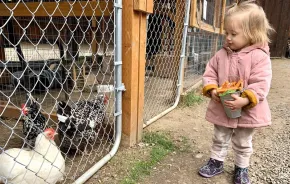
On a Tuesday evening in the children’s section at Half Price Books in Redmond, a small, dark-haired girl is multi-tasking. She's earnestly reading aloud from a Puppy Patrol book while petting a small gray-and-black dog named Raven.
Just around the corner, a girl in a green dress sits cross-legged in front of a very relaxed white-and-tan spaniel. “The book is getting funny,” she says to the dog, and holds up her Splat the Cat book so he can see one of the pictures. Scattered around the children’s section, six more dogs of various sizes and shapes (a golden retriever, a shih tzu mix) sprawl on blankets, waiting for a child to circulate to their station. At least a couple of pooches seem to be snoozing. Trainers wearing Reading With Rover badges quietly hold leashes.
Interacting with dogs, cats, horses and even fish can improve mental and physical health in children.
“It’s cool when you see a child who is scared of dogs and by the end of the read they’re petting the dog,” says Leslie Williams, the friendly trainer who is coordinating the evening's session. She shares success stories from the Reading with Rover program: kids who have gone up several reading levels; kids who go home and read aloud to their goldfish.
To a parent of an anxious reader, the benefit of reading aloud to a calm, nonjudgmental animal friend is intuitive. But now science is catching up. Research suggests that interacting with dogs, cats, horses and even fish can improve mental and physical health in children. And kids who struggle with reading experience less anxiety when their audience is a friendly canine. “A child feels a lot safer,” says Reading With Rover cofounder Becky Bishop. “He won’t get corrected for taking his time or stuttering. You’ve also got empathy; they’re petting the dog if they get nervous.”
And luckily, there are a growing number of programs around Puget Sound that provide opportunities for kids to share a love of books with an animal.

Reading with Rover
Founded in 1995, Reading with Rover is the most established read-to-a-dog program in the Puget Sound area and one of the oldest such programs in the country. Bishop started with three dog-and-trainer teams; now her nonprofit boasts 200 dog-and-trainer teams that participate in hundreds of reading events a year, including regular public programs at local public libraries (including Bellevue's Lake Hills, Federal Way 320th, Renton, Snohomish and many others) and book stores (including Half Price Books in Redmond and others). All teams have to pass a therapy dog evaluation before they can participate and are mentored for additional 10 training hours with children before they are fully “badged.”
Reading With Rover’s public events often include other perks for kids, such as a “paw-to-graph” sheet that children can fill up by circulating to each station (the trainer will stamp the kid’s sheet). They can also collect stickers and dog bookmarks.
Reading with Rover also participates in reading programs in six school districts around the Sound, where the dogs work with kids with reading delays and other issues to build not just reading skills but overall confidence. One of Bishop’s favorite stories is about a boy named Ryan, who was regularly invited to read in the “Rover room.”
“He couldn’t find his voice, and would read at a whisper,” she recalls. One day, as he was headed back to class, she invited him to introduce his reading dog, Boomer, to the other students. He did.
“The teacher was in tears,” says Bishop. “She said he had never spoken out loud in the classroom.”

Here, kitty kitty
Is your child more of a feline fan? Consider giving Kitty Literature a try; it's a three-year-old program of Bellevue-based Seattle Humane. But while Reading With Rover has a low bar for participation — families can simply show up for one of its public events — Seattle Humane’s program requires more effort because the kids are effectively volunteers who are helping socialize the cats.
Seattle Humane, which opened a beautiful new building in 2017, started the Kitty Literature program after many requests for volunteer opportunities for younger kids. (The animal shelter has an established volunteer club for teens.) It’s proven to be a win-win. The program “fosters that natural connection that kids have towards animals,” says volunteer coordinator Jen Whitworth, as well as giving kids a chance to practice reading. It also helps shelter cats get used to humans, which can make them more adoptable.
The one downside: Because the cats can be quite shy, there’s no guarantee that kitty contact will actually happen.
Still, for the right child it can be a great starter volunteer opportunity. Here’s how it works: Interested parents go to Seattle Humane’s Kitty Literature web page, fill out a form and waiver, and watch two introductory videos (watch one with the kids, which shares tips on interacting with the cats). Once your application is approved by Whitworth, you can sign up for a 20-minute reading stint in one of the cat community rooms.
I took my cat-crazy son and his friend on a recent Monday afternoon. Parking was easy; once we were in the building, we signed in, picked up our badges (the kids loved feeling official), and headed to Catville (look for the deep red wall with the white sign). We wound around the cat kennels, eventually finding the community rooms, light-drenched spaces that contain climbing structures for cats and a couple of chairs.
The kids were excited, and loved looking at the kitties but had a hard time sustaining interest in reading aloud to the two cats who shied away from contact. The volunteers were very helpful and directed us to another community room where the cat was more amenable to petting and reading.
My recommendation is to frame it as more of a volunteer opportunity, and be direct about the challenges. Self-motivated readers interested in learning about animal behavior have the best chances of success.
While you’re there, check out Seattle Humane’s new building, which includes a small Mud Bay outlet on the premises. But be careful of straying too far: You may end up with a new member of the family.
If you go...Reading with Rover: The program’s public reading events include regular read-to-a-dog nights at libraries and book stores. All are free and you don’t have to register in advance. Find out more about the events, program and volunteer opportunities here. Reading With Rover also brings programs to schools, hospitals and assisted living facilities. Project Canine: Project Canine is another therapy dog nonprofit that runs read-to-a-dog programs, called Bow Wows and Books, at Seattle-area libraries. Find events and how to volunteer here. Kitty Literature: To volunteer with Seattle Humane’s program for 5- to 10-year-olds, parents must fill out several forms and watch two videos in advance. Families can then sign up for 20-minute stints of reading to cats in the community rooms, available Monday through Friday. Find out more here. Seattle Humane also has a teen club and an educational Max Mobile that will come to schools and events. More reading with animals opportunities: Pierce County Library offers read-to-a-dog sessions at its Fife, Graham, Sumner and Parkland/Spanaway branches. Check the calendar for a upcoming sessions; filter for "children" or by your preferred branch to narrow results. Everett Public Library hosts a Paws to Read program at its Evergreen Branch, typically on Monday afternoons. Check the calendar of events for upcoming dates. |











